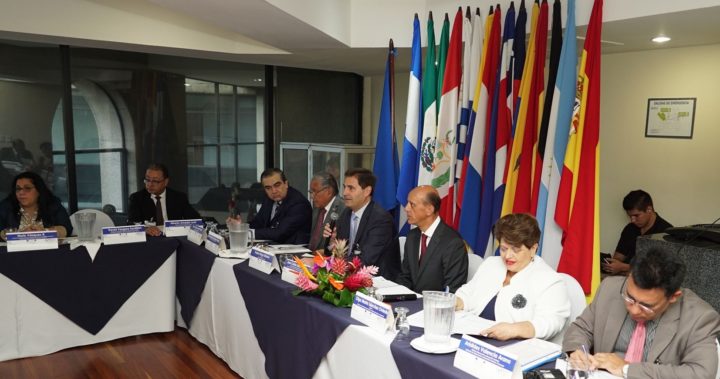The 4th ordinary meeting of the Network, where Costa Rica’s MIDEPLAN takes on the new Presidency, was attended by senior authorities from the Mexican, Salvadoran and Bolivian governments, among others

Emphasising how important these networks are as a vehicle for exchanging experiences among peers and the possibilities they bring for implementing best practices in the region, the meeting began with the opening ceremony, chaired by Pedro Flores, Director of FIIAPP, Melquiades Morales, Mexican Ambassador to Costa Rica and Olga Marta Sánchez, Costa Rican Minister of Planning. Also attending the discussion were Arístides Valencia, the Salvadoran Minister of Government and Hugo Siles Núñez, the Bolivian Vice Minister for Autonomies.
The Network is a space for member countries to discuss public policies for regional development and to share experiences and knowledge on national policies for regional development in pursuit of better territorial cohesion in each country.
Marisa Ramos, Coordinator of the Programme’s Democratic Governance Area, moderated the discussion, attended by specialists from international and regional organisations. There were contributions from Gianluca Spinaci, from the EU Committee of the Regions, Laura Ruiz from SEGIB, and José Antonio Ardavin from the OECD. During this session, the participants reiterated their interest in accessing much of these organisations’ documentation and best practice in areas such as developing indicators, regulations and new ways of municipal funding.
The Mexican Secretariat of Agricultural, Territorial and Urban Development (SEDATU) held the presidency of the Network for the two-year period from 2015 to 2017. Alberto Amador Leal, Director General of Regional Development of Mexico’s SEDATU focused his paper on presenting the activities which the Network has implemented in this period and the challenges to be faced in the future.
EUROsociAL+ will continue to support the Network based on a specific request by its Technical Committee which revolves around Territorial Management Instruments which Permit Better Multi-Level Governance, Efficient and Sustainable Use of the Territory and Closing Socioeconomic Gaps between Territories, which represents a regional need it deems relevant to address for the benefit of each member country. The project formulation was presented by Diana María Ramírez from the Sustainable Territorial Development Division of Colombia’s Planning Department. The first day concluded with some country experiences which will provide input towards the development of the project. More specifically, these experiences were those of Chile, presented by Osvaldo Henríquez, Head of the Policies and Decentralisation Department of Chile’s Secretariat for Regional Development (SUBDERE); those of Bolivia, delivered by Vice Minister Hugo Siles Núñez; and those of the Saxony region of Germany, presented by Wolf-Uwe Sponer, Director of the Territorial and Regional Planning Division of Germany’s Interior Ministry.
The second day began with the presentation of the process that Costa Rica is conducting for the approval and development of the Draft Regional Development Bill “Opportunity for a more inclusive and participative society and more efficient public management”. It was presented by the country’s Minister for National Planning and Economic Policy (MIDEPLAN), Olga Marta Sánchez Oviedo. The members of the Network then debated the best institutional format for it to adopt, finally deciding that, for now, it would not adopt a distinct legal personality. Finally, some other institutional aspects of the Network were defined, including: i) drawing up of the Articles of Incorporation and Association; ii) electing the new President; iii) new Technical Secretariat, iv) Definition of key topics and work groups; v) Work plan of the Network, vi) inclusion of new countries in the Network.
It was unanimously decided that Costa Rica will take on the presidency of the Latin American Network of Public Policies for Regional Development for the two-year period from 2017 to 2019.
The 4th Meeting of the Network ended with the signing of an agreement in which it was determined that six key topics would be worked on: instruments for territorial planning; cross-border cooperation; indigenous populations; innovation and territory; sustainable cities; and a geographical information and statistics system; as well as gender and territorial approaches to sustainable development and public policies as transversal themes. Another of the agreements was to include Panama and the Dominican Republic as members of the Network.
EUROsociAL+. Área de políticas de gobernanza / governance policies unit, FIIAPP



